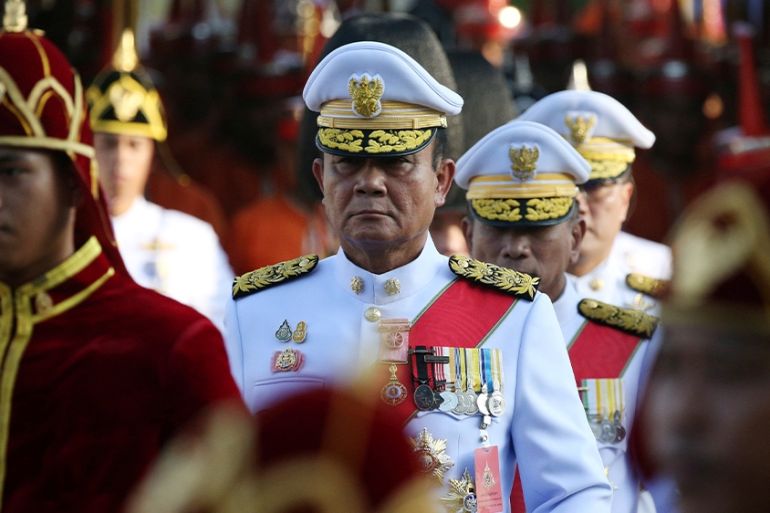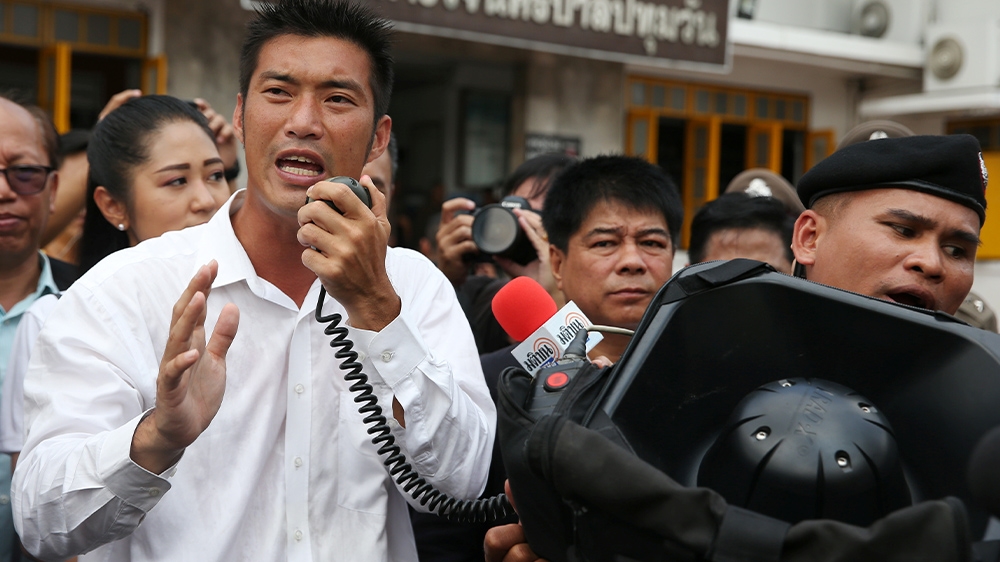Thailand’s parliament meets, but military retains upper hand
Elections took place on March 24 under a complicated new system that empowered small parties – and the military.

Bangkok, Thailand – Thailand’s newly-elected parliament sits for the first time on Friday, as pro-military and pro-democracy parties manoeuvre for power two months after controversial elections that ensured the armed forces the upper hand in the country’s fractious politics.
General Prayuth Chan-ocha, who led the coup that took place five years ago this week and headed the military government’s National Council for Peace and Order (NCPO), seems most likely to become the country’s next prime minister because the position requires a majority across both houses of parliament.
There are 500 seats in Thailand‘s lower house – 375 directly-elected and the rest allocated according to a party list – and 250 in the upper house whose members have already been chosen by the military government.
Phalang Pracharat, the military-backed party created to support Prayuth, won the second highest number of seats in the lower house in the March 24 election, and is now trying to scrabble together a workable coalition with the smaller parties to achieve a majority.
A record 27 parties won seats in the poll thanks to a new formula that meant a party only needed to get 30,000 voters overall to secure a seat.
No party has an overall majority in the lower house, but the three biggest parties are Pheu Thai, which is backed by exiled former Prime Minister Thaksin Shinawatra, with 136 seats; Phalang Pracharat, with 115; and Future Forward, with 80. Pheu Thai and Future Forward have agreed to work together already.
Phalang Pracharat “will need to secure only 11 more votes in the house to win the premiership for Prayuth with the support of all the 250 senators,” Termsak Chalermpalanupap, of Singapore’s ISEAS-Yusof Ishak Institute, wrote in a commentary earlier this month. “As things stand now, Phalang Pracharat will be able to find more than enough votes to accomplish this crucial mission.”
Key will be the votes of the Democrats, with 52 seats, and Bhumjaithai, with 51 seats.
The two parties are also being wooed by the pro-democracy grouping led by Pheu Thai, which was leading the government at the time of Prayuth’s 2014 coup.
“We would like to call for the last two big parties to make the right decision,” said Tida Yingcharoen, Pheu Thai’s deputy spokesperson, referring to the Democrats and Bhumjaithai. “This is a critical time for Thailand. We ask them to respect the voice of their voters who support democracy.”
Bhumjaithai’s leader Anutin Charnvirakul is meeting both sides, and the number of cabinet seats on offer is likely to be a key consideration in his deliberations.

Under former leader Abhisit Vejjajiva, the Democrats ruled out ever working with Pheu Thai, but now that Abhisit has resigned and the party has a new leader – Jurin Laksanavisit – it is unclear which side they will support.
Thanathorn Juangroongruangkit, the leader of Future Forward, which wants the military reformed and out of public life, has put himself forward as an alternative prime ministerial candidate in an attempt to reconcile Pheu Thai and the Democrats.
But Phongphisoot Busbarat, a lecturer at Chulaongkorn University’s faculty of political science, expects both the Democrats and Bhumjaithai will – eventually – fall in with Phalang Pracharat.
“Perhaps [they] will try to play this game as long as they can, but I think their voters are not patient enough for them to drag this on,” he said. “I think the longer they drag this on the more they lose their support. The smaller parties have sided with Phalang Pracharat, so the Democrats and Bhumjaithai will too.”
Reform call
Future Forward faces troubles of its own thanks to a slew of cases filed since its strong showing in the election.
Late on Thursday, the Constitutional Court blocked Thanathorn from taking up his seat in parliament while it investigates allegations that he violated election rules.
On May 28, the attorney general will also decide whether to proceed with charges against Thanathorn and two other party leaders under the Computer Crime Act for “uploading false information” in a speech about the military.
“We need to abolish the legacy of the NCPO, reform the military and amend the constitution,” said Pannika Wanich, spokeswoman for Future Forward. “This has made us an enemy of the NCPO and the old elites. No more coups in Thailand.”
King Maha Vajiralongkorn, whose coronation took place earlier this month, has already approved the appointment of the 250 senators, bringing Prayuth’s next stint as prime minister a step closer.

“If this happens I think people will [continue to] be living in fear,” said Nada Chaiyajit, a Thai human rights activist, who backs the democractic coalition. “There is no more freedom of expression in Thailand.”
Pro-democracy parties hope the upper house, which starts sitting later on Friday, will honour the outcome of the election.
“At this point, we’re calling on the 250 senators to respect Thai voters. The majority [of Thais] want democracy,” Pheu Thai’s Tida Yingcharoen said.
Whichever side manages to form a government, they will need to control unwieldy coalitions of parties and are unlikely to have the numbers in the lower house for a clear majority, Phongphisoot said.
Politicians fear the military could use any paralysis as an excuse to deepen control over the country.
“It’s dangerous when people believe that the parliamentary system can’t solve the country’s problems because that opens the door to military intervention,” said Future Forward’s Pannika Wanich.
“I think we’ll see the shape and face of the new government within this week. And we’ll know whether we can move the country forward or whether we will be under the NCPO regime for the next three to four years.”